Meaning of 'Don't Throw the Baby Out With the Bathwater'
The original meaning of this proverb might surprise you.

We have heard many proverbs. They are wise sayings that express a truth based on common sense that tell us what to do and warn us of things not to do. We might say some proverbs without knowing the meaning or origin of them. We say them just because we hear others say them.
Perhaps you have heard someone say, "Don't throw the baby out with the bathwater." It really does have a significant meaning and an interesting origin.
The Meaning
"Don't throw the baby out with the bathwater" simply means "Don't discard something valuable along with something undesirable. " It also means "Don't lose something useful when getting rid of something useless." In the wise saying, something good is eliminated while getting rid of something bad. It is a way of discarding something favorable accidental or deliberately at the same time something unfavorable is thrown away.
The Origin
Most experts agree that it is a German proverb that originated in the 1500s. The expression was part of everyday German language from then onward, but it didn't emerge into English until the late 19th century.
One claim is that in medieval times people had to share scarce bathwater. All people in a household took their baths in the same tub of water. The arrangement was that the older family members took their baths first. By the time the baby was bathed, the water was so dark and dirty that the child was in great danger of accidentally being thrown out unseen in the bathwater. The warning of the proverb is to throw out the useless bathwater but be careful to keep the precious baby.
Examples of This Proverb
In a leadership meeting, one leader had a good idea that would help the organization. Just become another leader didn't like a small part of the suggestion, he disapproved of the whole plan. In other words, he threw out the good idea (baby) along with the bad idea (dirty bathwater).
Another example is that a husband had tickets for one of his favorite concerts. He presented them to his wife, but she was angry because he didn't tell her in advance. Therefore, she refused to go even though it was also her favorite concert. She threw the baby (the tickets) out with the bathwater (her refusal to go).
A third example is when Jack quit his lucrative job because his ex-girlfriend was promoted to be his boss. He threw the baby (his job) out the window with the bathwater (his refusal to work for his ex-girlfriend).
Other Don'ts Proverbs
Proverbs are intended to pass on popular wisdom. Not all proverbs begin with "Don't or Do not." However, many of them do begin that way. They frequently warn people what not to do. Perhaps you are familiar with some of them.
- Don't cast your pearls before swine .
- Don't change horses in midstream .
- Don't count your chickens before they are hatched .
- Don't put all your eggs in one basket.
- Don't get mad, get even .
- Don't cut off your nose to spite your face.
- Don't let the cat out of the bag .
- Don't look a gift horse in the mouth .
- Don't upset the apple-cart.
- Don't take any wooden nickels.
- Don't wear out your welcome.
- Don't put the cart before the horse.
- Don't make a mountain out of a molehill.
- Don't air your dirty laundry in public.
Sometimes proverbs can be understood without explanations. Sometimes proverbs need an explanation and information about their origins for them to make sense.
Hopefully, "Don't throw the baby out with the bathwater" makes sense now that you have read the meaning and the origin of the wise saying.
About the Creator
Margaret Minnicks
Margaret Minnicks shares articles with readers all over the world. Topics include celebrities, royal family, movies, television, foods, drinks, health issues, and other interesting things. Thanks in advance for TIPS that are sent my way.






Comments
There are no comments for this story
Be the first to respond and start the conversation.